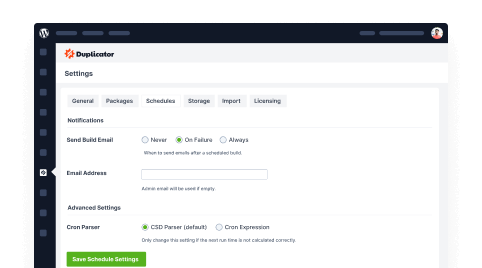Overview Quick Overview
What are the basics of the Duplicator Plugin?
Overview
Duplicator is a WordPress plugin that migrates WordPress sites between hosts or domains. This includes all plugins, themes, custom content, and the WordPress core files so you get an exact copy of your site. The plugin also serves as a backup and restoration system. The Duplicator consists of two separate code bases (versions).
- Duplicator Lite: This is the free version of the product and can be downloaded for free from WordPress.org
- Duplicator Pro: This is the professional commercial version of the plugin and can be purchased here. The professional product has four versions: Basic, Plus, Pro, and Elite. For a full overview, see the comparison page.
Migration Steps
The process for migrating a site is easy:
- Bundle up your site into a ‘Package’ which consists of two files an archive.zip/daf and installer.php
- Copy the Package files to a new location
- Point your browser to the installer.php file and follow the simple directions to install the site
- Alternatively, you can import the archive.zip/daf file into an existing WordPress site
Steps Duplicator Steps
What are the steps involved with migration?
Step 1: Create Backups
The plugin will back up all your selected files and database tables (that you don’t filter/exclude). Duplicator puts all your selected WordPress files and a scripted copy of your database into a single zip file called an archive and generates an installer to help restore the archive. The installer and archive files are referred to as a package. You can then download the package files to a different location where you can re-install your site.
Step 2: Install Backups
At install time, the following actions happen:
- Archive Extraction. All WordPress files, including the database script, are extracted from the archive.
- Database Creation. The database script is executed to restore the original data in the new database.
- Database Scrubbing. Every table is processed, and the old URLs are replaced with new ones.
Various storage methods are considered (PHP serialization, JSON, Base64, etc…) - Optional Overhead. Duplicator Pro has additional logic that runs, such as multisite manipulation.
- Config File Scrubbing. The wp-config.php is scrubbed for updates to the defined variables
- .htaccess set. The .htaccess file is reset for the new location
In 99% of most cases it will work with your theme and your plugins. However there can be issues at install type where data was not able to port correctly.This is where you will need to read the final report on step 3 of the installer and validate the options that the plugin could not update.If you run into any errors or warnings please read the section directly below.
On 64 bit versions of PHP there is effectively no limit on .zip file size, however the maximum file size supported on 32-bit PHP is 2.1GB. Note that most hosts support 64-bit PHP.CPU and memory constraints imposed by your host may also limit the zip file size by cutting off the build early. Because of this, we developed the DupArchive format to get around these host limitations. When using the DupArchive engine, Duplicator Lite can bundle sites up to 500MB, while Duplicator Pro has no size limit outside of the limit imposed by your PHP architecture.
Products Duplicator Versions
How does Pro differ from the Lite version?
A Pro vs free comparison list can be found on the comparison page. While Pro will continually improve and add features, the Lite (free) version of the plugin is not expected to have any new major features except for bug fixes and smaller tweaks. Pro also supports shell_exec and Ajax callbacks for larger sites for PHP ZipArchive, which allows for larger packages up to 2GB on most servers.
Page Overviews:

